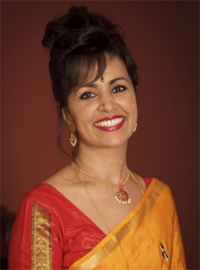
CULTURE COUNTS
“I wish my son had cancer instead of depression” the mother of an Indian teenager I recently met said to me. “If he had cancer, I could at least share our pain with our family and friends, and ask them for help” she said, tears streaming down her face.
My heart breaks every time I hear about the deep sense of isolation many Indian families feel in supporting their loved one struggling with mental health issues. As an Indian woman who has struggled with debilitating anxiety and depression, I know first-hand the difficulties of overcoming the stigma of mental illness within the Indian community. Growing up in India, my family and I had no understanding of mental health issues. By the time I was 18, I was debilitated by undiagnosed generalized anxiety disorder and panic attacks. At 23, as a young mother in America, I struggled to free myself from the death-hold of depression. And, at 25, on a trip back home to India, I suffered a massive breakdown and became obsessively suicidal. Finally, my family physician recommended that my parent’s take me to a psychiatrist.
“I pray no one we know sees us here, Gayu,” my mother had whispered, scooting closer to me in the waiting room. “You never know the vicious rumors people can spread.” Within minutes of examining me, the psychiatrist had diagnosed me with clinical depression. But, the diagnosis soon became a noose that threatened to destroy me and my family. Ironically, in India, where our national motto declares “truth alone triumphs” my family and I were terrified that my truth, my diagnosis of mental illness, will destroy us all. So, we decided to keep my diagnosis a secret. And, my family and I lived like prisoners in our home, hiding behind a veil of shame and secrecy. Despite my return to the U.S. and access to the best medical care, I continued to suffer recurrent bouts of depression. Years later, after yet another failed suicidal attempt, I finally chose to be hospitalized. On April 30, 1989, Confined in the seclusion room of a psychiatric ward, stripped of freedom, dignity, hope and humanity, I promised to emerge a messenger of hope and healing. For every indignity that I had suffered in shame and silence, I promised to fight to restore my dignity and the dignity of others like me around the world. And for every moment that my family and I had lived in despair, I promised to bring hope to the lives of others like us.
Although my stay at the psychiatric hospital was traumatic at times, it was ultimately life-transforming. For the first time in my life, I met others like myself in the hospital, people with mental illness, and I realized that I was not alone. The caring staff, and the many educational opportunities and therapeutic interventions they offered, helped me pave my path to recovery. One day, one step at a time, with self-determination, hard work, effective treatment, and the unconditional love and support of family and friends, I have created a healthy, meaningful life. Today, as the Founder and President of ASHA International www.myasha.org a nonprofit organization promoting personal, organizational, and community wellness, and the author of my upcoming memoir Shadows in the Sun: Healing from Depression and Finding the Light Within, I am dedicated to helping others struggling with depression and mental health issues to overcome barriers to recovery and achieve wellness.
According to a recent article in India West by Sunita Sohrabji, the suicide rate among Indian Americans is on the rise. We are stressed, depressed, and struggling with other mental health issues. But, we don’t like to talk about it. Nor, do many of us like to seek help. Unfortunately, the cultural stigma surrounding mental illness sentences people into lives of shame, secrecy, and needless suffering, and prevents people from seeking life-saving treatment and support.
As a mother and mental health advocate, the struggles of families breaks my heart, and strengthens my resolve to promote mental health awareness, and bring hope and healing to people struggling with mental health issues and their families. It is time we break the silence surrounding mental illness in the Indian community, and start the conversation about mental health If not for us, we have to do it for our children’s sake. Fortunately, organizations like the Depression and Bipolar Support Alliance, and ASHA International can help us get started.
Links


